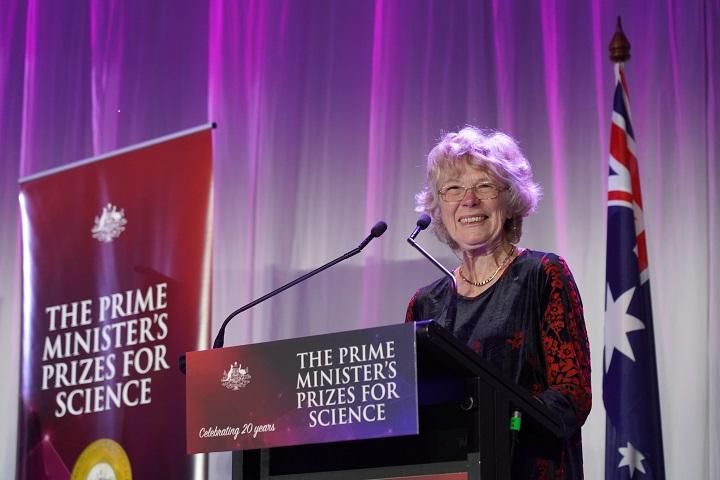Dr Foley congratulates Australia Day award recipients

Image: Emeritus Professor Cheryl Praeger receives the 2019 Prime Minister’s Prize for Science.
Australia’s Chief Scientist, Cathy Foley, congratulates recipients of Australian honours this week, including mathematician Emeritus Professor Cheryl Praeger, who received the nation’s highest award.
Professor Praeger was one of four people appointed Companions of the Order of Australia.
She received the recognition for her contribution to the discipline and as a champion of women in science, mathematics and engineering careers.
Dr Foley commended Professor Praeger’s leading work in the field of mathematics.
“Professor Praeger is eminent in her own right, and she also stands as a role model in a field where women are historically underrepresented,” Dr Foley said.
“Her determination to pursue her passion for maths as a child and a student and her achievements will inspire other women to choose mathematics careers.”
Professor Praeger’s professional interest is the mathematics of symmetry, and when she won the 2019 Prime Minister’s Prize for Science, she noted that symmetry is everywhere in the natural and built environments, from spiral galaxies to spiral shells on the beach. The citation for that award noted her contributions to group theory, which is key for secure banking and internet communication, permutation group theory, used in applications such as solving Rubik’s Cubes, and combinatorics.
She developed her love of mathematics as a child in Queensland and went on to study the subject at university in the late 1960s, when two female mathematicians were on the staff at the University of Queensland. Having women in the department meant it “didn’t seem such a strange prospect to be a mathematician”, as she told a fellow mathematics professor Bernhard Neumann in an extended interview about her life and career in 1999.
Professor Praeger’s career included stints at the Australian National University, and at Oxford University, before she accepted a position at the University of Western Australia, where she was appointed professor in 1983.
The Australia Day awards recognised the work of a number of scientists, reflecting the centrality of science to Australia’s identity and its prosperity, Dr Foley said, congratulating the recipients across the award categories.
She described the work of these scientists and researchers as variously pioneering, inspiring and world leading.
Among scientists appointed Officers in the Order of Australia were:
- Emeritus Professor Christopher Fell, who works in nanotechnology and is chairman of the Australian National Fabrication Facility.
- Electrical engineer Professor Graham Goodwin, of the University of Newcastle, whose roles include director of the Australian Artificial Pancreas Program.
- Dr Barry Inglis, former director of the National Measurement Laboratory.
- Professor Helene Marsh, at James Cook University, who works on the conservation of marine mammals.
- Dr Brian O’Brien, a researcher of lunar dust.
- Geotechnical engineer Professor Mark Randolph, of the University of Western Australia.
- Dr Russell Reichelt, former chairman of the Great Barrier Reef Marine Park Authority, for his work on marine conservation and climate change.
Among those recognised in fields of medicine were:
- Professor Alan Cass director of the Menzies School of Health Research, and director of the Bridging the Gap Foundation, whose work includes a focus on the prevention and management of kidney disease.
- Professor William Charman, dean of Pharmacy and Pharmaceutical Sciences at Monash University and chair of the International Pharmaceutical Federation.
- Professor Susan Davis, at Monash University, an endocrinologist, professor of women’s health, and president of the International Menopause Society.
- Professor Peter Leedman, director of the Harry Perkins Institute of Medical Research in Western Australia.
- Professor Robert Moulds, Professor of Medicine at the Fiji School of Medicine, including for his work on therapeutic guidelines.
- Professor Helen O’Connell, Professor of Urology at the Melbourne Medical School.
- Professor Roger Reddel at the University of Sydney for his biomedical research, including on adult and childhood cancer and genetics.
